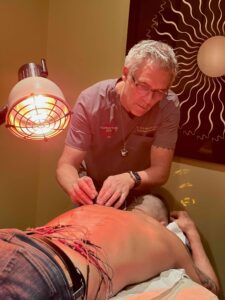The mechanism behind acupuncture’s pain-relief benefits involves complex interactions among the nervous system, brain chemistry, and the body’s natural healing processes. To better understand, here are several ways acupuncture achieves its pain-relieving effects:

Dr. Tony uses Acupuncture needles to relieve pain in Delray Beach.
One key mechanism is that acupuncture stimulates the release of endorphins, which are the body’s natural pain-relieving chemicals. Endorphins act on the opioid receptors in the brain and spinal cord, reducing the perception of pain. For instance, research has demonstrated that acupuncture increases endorphin levels in cerebrospinal fluid, providing a physiological foundation for its analgesic effects (Han, J.S., 2004).
In addition, acupuncture has been found to influence levels of neurotransmitters such as serotonin and noradrenaline, which are essential for pain perception and mood regulation. By altering the balance of these neurotransmitters, acupuncture impacts pain-signaling pathways and enhances emotional well-being (Zhao, Z.Q., 2008).
Moreover, acupuncture aligns with the gate control theory of pain. According to this theory, acupuncture stimulates large nerve fibers that inhibit pain signals in the spinal cord. In essence, this activation “closes the gate” to pain perception by engaging inhibitory pathways (Melzack, R., and Wall, P.D., 1965).
Furthermore, acupuncture has been shown to reduce inflammation by decreasing the production of pro-inflammatory cytokines and promoting the release of anti-inflammatory substances. As a result, these anti-inflammatory effects can provide pain relief, particularly in conditions where inflammation plays a significant role (Zijlstra, F.J., et al., 2003).
Additionally, acupuncture influences the autonomic nervous system, helping to balance the sympathetic (fight-or-flight) and parasympathetic (rest-and-digest) systems. This balance, in turn, indirectly affects pain perception while promoting overall well-being (Huang, C., et al., 2013).
In summary, acupuncture’s ability to reduce pain is mediated through multiple physiological mechanisms, including neurotransmitter regulation, nervous system modulation, and anti-inflammatory effects. As clinical studies continue to highlight, acupuncture is effective for managing various types of pain, including chronic pain conditions. By integrating acupuncture with conventional medical approaches, patients can benefit from a holistic and comprehensive pain management strategy.
At Acupuncture Zen, Dr. Tony Willcox leverages his training from Anhui and Shanghai, China, to provide pain relief and improve the quality of life for patients in Delray Beach, Florida. Through his expertise and dedication, he continues to bring the benefits of acupuncture to those in need.
References:
– Han, J.S. (2004). Acupuncture and endorphins. Neuroscience Letters, 361(1-3), 258-261.
– Zhao, Z.Q. (2008). Neural mechanism underlying acupuncture analgesia. Progress in Neurobiology, 85(4), 355-375.
– Melzack, R., & Wall, P.D. (1965). Pain mechanisms: A new theory. Science, 150(3699), 971-979.
– Zijlstra, F.J., et al. (2003). Anti-inflammatory actions of acupuncture. Mediators of Inflammation, 12(2), 59-69.
– Huang, C., et al. (2013). Modulation effects of acupuncture on functional connectivity of the autonomic nervous system. Neuroscience Letters, 558, 114-119.